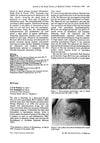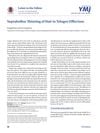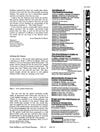 163 citations,
November 2003 in “Journal of Investigative Dermatology”
163 citations,
November 2003 in “Journal of Investigative Dermatology” Low iron levels may be linked to some types of hair loss in women.
 October 2024 in “Dermatology Practical & Conceptual”
October 2024 in “Dermatology Practical & Conceptual” Vitamin D3 deficiency is common in Pakistanis with diffuse hair fall, and early treatment is advised.
 May 2022 in “Journal of the Egyptian Women's Dermatologic Society (Print)”
May 2022 in “Journal of the Egyptian Women's Dermatologic Society (Print)” Women's hair loss can be due to hormonal changes and various conditions, with treatments focusing on stopping progression and managing symptoms.
 48 citations,
May 1999 in “International Journal of Dermatology”
48 citations,
May 1999 in “International Journal of Dermatology” Alopecia areata is an unpredictable autoimmune hair loss condition, treated based on severity, with half of patients regrowing hair within a year without treatment.
 30 citations,
August 1983 in “Pediatric Clinics of North America”
30 citations,
August 1983 in “Pediatric Clinics of North America” Most hair loss in children is caused by a few common conditions, and it's important to diagnose these properly and support the child's mental health.
 2 citations,
February 1981 in “Journal of the Royal Society of Medicine”
2 citations,
February 1981 in “Journal of the Royal Society of Medicine” A three-year-old girl survived a rare serious infection caused by BCG vaccination, which improved after treatment with a leprosy drug.
 November 2024 in “Skin Appendage Disorders”
November 2024 in “Skin Appendage Disorders” Telogen effluvium most affects quality of life in alopecia patients.
 July 2022 in “Journal of Investigative Dermatology”
July 2022 in “Journal of Investigative Dermatology” Substance P may contribute to hair loss by increasing oxidative stress and mitochondrial activity in hair follicles.
 July 2022 in “Journal of Dermatology and Dermatologic Surgery”
July 2022 in “Journal of Dermatology and Dermatologic Surgery” People with chronic hair loss often have lower Vitamin B12 levels.
 1 citations,
January 2017 in “Yonsei Medical Journal”
1 citations,
January 2017 in “Yonsei Medical Journal” Hair is thinner near the scalp in acute hair shedding conditions.
 1 citations,
October 2013 in “A & A case reports”
1 citations,
October 2013 in “A & A case reports” Hair loss from telogen effluvium may not happen again after another surgery.

Detailed history and physical examination are crucial for diagnosing hair loss.
 January 2017 in “Springer eBooks”
January 2017 in “Springer eBooks” Over 40% of postmenopausal women experience hair loss, with treatments aiming to stop further loss and possibly thicken hair.
 September 1980 in “PubMed”
September 1980 in “PubMed” Using selenium disulfide on guinea pigs increased hair loss.
 3 citations,
February 2017 in “Italian journal of dermatology and venereology”
3 citations,
February 2017 in “Italian journal of dermatology and venereology” Hair loss might be the first sign of dengue fever.
May 2022 in “GLOBAL JOURNAL FOR RESEARCH ANALYSIS” COVID-19 can cause temporary hair loss.
 October 2023 in “Recent Trends in Pharmaceutical Sciences and Research”
October 2023 in “Recent Trends in Pharmaceutical Sciences and Research” The paper concludes that animal models help in understanding hair loss causes and developing new treatments.
 8 citations,
August 2016 in “Acta dermato-venereologica”
8 citations,
August 2016 in “Acta dermato-venereologica” Timolol eye-drops can cause hair loss.
 August 1978 in “Dicp-The annals of pharmacotherapy”
August 1978 in “Dicp-The annals of pharmacotherapy” Crash diets can cause temporary hair loss, and professional medical advice can prevent serious health issues.
 1 citations,
August 1978 in “Dicp-The annals of pharmacotherapy”
1 citations,
August 1978 in “Dicp-The annals of pharmacotherapy” A liquid protein diet caused hair loss in a young woman.
 February 2024 in “PubMed”
February 2024 in “PubMed” More people experience hair loss after recovering from COVID-19 in hospitals than in outpatient settings.
14 citations,
July 2022 in “Nutrients” Vitamin A is important for healthy skin and hair, influencing hair growth and skin healing, but UV light reduces its levels.
 January 2015 in “Springer eBooks”
January 2015 in “Springer eBooks” Hair shedding that lasts more than 6 months may need medical tests, but often just reassurance is enough.
 January 1978 in “Clin-Alert”
January 1978 in “Clin-Alert” A document listed serious side effects from various drugs, including deaths and diseases, emphasizing the importance of being aware of drug side effects.
 1 citations,
October 2022 in “Current Dermatology Reports”
1 citations,
October 2022 in “Current Dermatology Reports” COVID-19 and vaccines cause various skin reactions and highlight the need for dermatologists in managing these issues and addressing vaccine distribution disparities.

The document concludes that diagnosing female hair loss requires careful examination, with treatments varying by condition and psychological support often necessary.
 56 citations,
August 2019 in “Clinical, Cosmetic and Investigational Dermatology”
56 citations,
August 2019 in “Clinical, Cosmetic and Investigational Dermatology” The document concludes that Telogen Effluvium is a hair loss disorder that can be assessed with the modified wash test and may be treated with clobetasol foam, with patient management being important.
January 2018 in “Hair therapy & transplantation” Hair health can indicate mental and general health.
 August 1994 in “Drugs & Therapy Perspectives”
August 1994 in “Drugs & Therapy Perspectives” Some drugs can cause hair loss or growth, but hair usually returns to normal after stopping the drug.
 January 2019 in “International Journal of Trichology”
January 2019 in “International Journal of Trichology” A woman lost all her hair in one day, was diagnosed with a rare type of hair loss, and regrew it in 12 weeks with treatment.



























